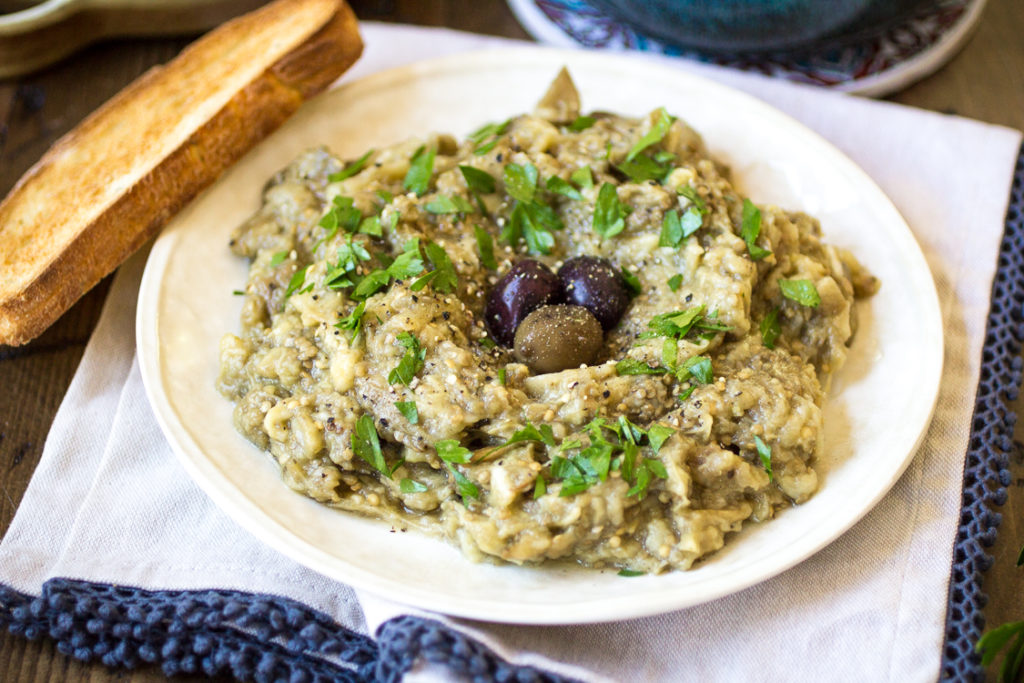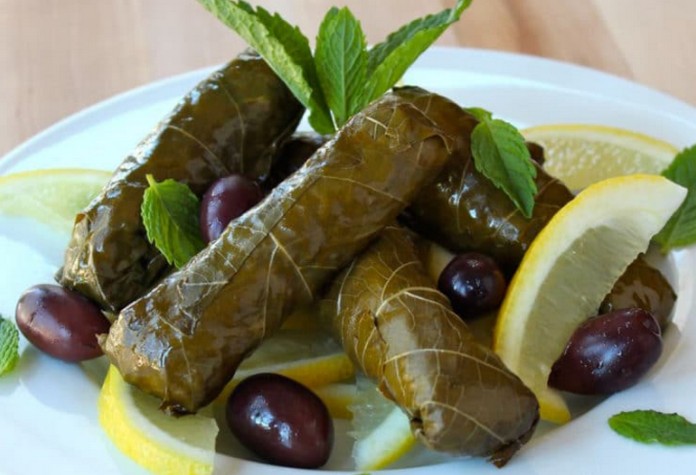12 Greek foods that are super healthy!
In the 1960s, Greeks lived longer and had fewer chronic diseases than the rest of the world. This was probably due in part to their diet, which was enriched with seafood, fruits, vegetables, seeds, beans and healthy fats. The Mediterranean diet is based on traditional Greek cuisine and other similar cuisines from surrounding countries. Research shows that following the Mediterranean diet can reduce the risk of heart attack, stroke, diabetes, obesity and premature death.
This article looks at 12 traditional Greek foods that are compatible with the Mediterranean diet and are extremely healthy, and discusses why this is so. Traditional Greek cuisine is not only delicious, but also incredibly healthy!!! Find out!

1. Eggplant salad
Eggplant salad is an eggplant spread or dip that is eaten with dinner and can be served as a snack. It is made from pureed roasted eggplants that have been mixed with olive oil, garlic and lemon juice. It is similar to a dish called baba ghanoush, which originated in the Middle East. Eggplant salad can be eaten in sandwiches in addition to an appetizer dip.
Eggplant is a good source of fiber and antioxidants, which fight the damage caused by cellular changes associated with aging, cancer and chronic diseases. Eggplants contain a powerful antioxidant called nazunin. Research suggests that nazunin may protect brain health. In addition, eggplant salad is flavored with lemon juice and garlic. These two ingredients are commonly used in Greek cuisine and offer their own health benefits. For example, garlic can boost the immune system and help prevent heart disease, while lemons are rich in vitamin C and can help prevent the formation of kidney stones.

2. Tzatziki
Tzatziki is another popular dip used in Greek cuisine. Although it is very creamy, it is quite low in calories, with about 35 calories per two tablespoons. Tzatziki is made from strained yogurt, cucumbers, garlic and olive oil.
The strained yogurt is processed to remove the water and make the yogurt creamier and thicker, preventing rapid spoilage. It also has a reduced lactose content, making it richer in protein. Just 100 grams of yogurt provides 10 grams of protein to the body. Protein is one of the most important nutrients for weight loss. It can help reduce appetite, regulate hunger hormones and increase metabolism.
3. Dolma
Dolmades are stuffed grape leaves with rice, minced meat and various spices that can be served as an appetizer or main course.
Grape leaves are low in calories and high in fiber. They are also high in vitamin A and vitamin K. In addition, they are very rich in antioxidants. In fact, research shows that they have ten times more antioxidant activity than grape juice or grape pulp. Moreover, they can improve blood circulation in people with chronic venous insufficiency. The dolmades are flavored with various herbs and spices. Herbs and spices are an important part of Greek cuisine and also contain many health benefits. For example, parsley and dill appear in many recipes for this dish. Dill is believed to be a good source of antioxidants and can slow the growth of pathogenic bacteria and fungi. It can also improve digestion. And parsley is an excellent source of vitamin K, which not only helps prevent blood clots, but also supports bone and heart health.

4. Gigantes plaki
Gigantes are large beans. The word "plaki" means a dish baked in the oven with vegetables and tomatoes.
Beans are very nutritious and are an excellent and important source of protein for vegetarians. They also aid in weight loss because they are rich in fiber and protein. In addition, research shows that people who eat more beans have a lower risk of heart disease. Beans are also known to help control blood sugar levels and diabetes.
5. Augolemono
Avgolemono is a traditional Greek technique used in soups. It is usually added to chicken or meat soups with vegetables and rice. It is basically a beaten egg with lemon.
Interestingly, some studies suggest that chicken soup can not only help reduce the symptoms of colds and flu, but also help fight them off. One study looked at the effect of hot water and hot chicken soup on a stuffy nose. It found that hot water and chicken soup was the best solution for relieving a cold. Another recent study showed that carnosine, a substance in chicken soup, fights the flu in its early stages. However, it is quickly metabolized, so the effect is temporary. Egg salad also contains a lot of protein from chicken and eggs, all relatively low in calories. A serving of traditional egg white chicken soup contains 27 grams of protein and 245 calories. However, it can contain a lot of sodium, so it may not be the best choice for people with salt sensitivities.
6. Lentil Soup (Fakes)
Lentil soup can be made with or without tomatoes and is a staple of the Greek diet. They are an excellent source of protein and fiber. One cup of lentils already contains 18 grams of protein and 16 grams of fiber. This so popular legume is known throughout the Mediterranean and is high in vitamins and minerals, making it an excellent food for vegetarians, as vegetarian diets are often low in iron, protein and zinc. In addition, research shows that lentils can help lower blood pressure, fight cancer, control blood sugar and lower cholesterol.
7. Souvlaki
Souvlaki consists of small pieces of cooked meat and is one of the most famous Greek dishes. It is sold in souvlaki stores throughout Greece and can be found in almost every Greek restaurant in the world. Souvlaki is usually made from pork, chicken, lamb or beef.
Meat provides many nutrients such as protein, iron and B vitamins. In addition, meat is a complete protein, meaning it contains all the essential amino acids. High-protein diets have been shown to help with weight loss and satiety. Meat consumption is also associated with increased muscle mass, which is especially important in older people. Kebabs are usually served in fast food restaurants with fries. However, you can also have a salad for a healthier meal.
8. Shrimps in the oven (Saganaki)
Shrimp saganaki is a traditional Greek appetizer that is delicious and healthy. It is essentially a salty tomato sauce in which shrimp are cooked and traditionally served in a pan, known as saganaki. Shrimp and other shellfish are an important part of the Greek and Mediterranean diet. They are also an extremely healthy food.
Shrimp are rich in protein and contain very little fat. An 85-gram serving contains 18 grams of protein and only 1 gram of fat. It also provides about 50% of your daily intake of selenium, which can help reduce inflammation and also reduces the risk of prostate cancer. Although shrimp is high in cholesterol, research shows that it has little or no effect on blood cholesterol in most people. Tomatoes are the other main ingredient in this dish and are rich in antioxidants such as vitamin C and lycopene. Lycopene is a powerful antioxidant that gives tomatoes their red color. It is associated with a reduced risk of heart disease and cancer.
9. Sardines Oven
Fish is an essential part of the Greek and Mediterranean diet. A high intake of fish, especially oily fish, has been repeatedly associated with many health benefits, including a reduced risk of heart disease. Sardines are one of the most commonly consumed fish in Greece. These small, oily fish are not only delicious, but also one of the healthiest foods you can eat. In fact, they are a great source of EPA and DHA. These are types of omega-3 fatty acids that are associated with many health benefits. 100 grams of sardines contain 473 mg of EPA and 509 mg of DHA, which can reduce the risk of death from heart disease by at least 25%. DHA is also vital for brain health. Not only is it critical for healthy brain development in infants, but it also promotes healthy brain aging.
In addition to the healthy fats that sardines provide to the body, they are also good for the bones, as they are high in protein, calcium and vitamin D. They are eaten in many different ways, the most popular being fried and served with oil and lemon.

10. Greek Salad
We are talking about the most popular Greek salad, known worldwide. It contains tomatoes, onion, cucumbers, olives and feta cheese, and is "sprinkled" with lots of olive oil and vinegar. All of these ingredients are packed with nutrients and are considered essential ingredients in Greek cuisine.
The vegetables in the salad make it high in fiber. These vegetables are also high in antioxidants and nutrients such as vitamin C, vitamin K and potassium. Olives and olive oil contain healthy monounsaturated fats. These fats can reduce the risk of heart attacks and strokes and reduce inflammation. Feta, which is often placed on salads, is another staple of Greek cuisine.
Feta is made from sheep and goat milk. It is good for your bones because it is high in calcium, protein and phosphorus. In fact, it contains more calcium than most cheeses.
11. Spinach & Rice (Spanakorizo)
Spanakoryzo is a dish of Greek cuisine with rice that is traditionally served with lemon, feta cheese and olive oil. Spinach is one of the healthiest vegetables you can eat because it contains vitamin A, vitamin C, vitamin K, folic acid, potassium and iron. It also contains many antioxidants that help prevent cell damage. Rice is also rich in many vitamins and minerals, including manganese, selenium and iron. However, iron from plant sources such as rice and spinach is not absorbed. Fortunately, this dish contains lemon, which helps with iron absorption due to the citric acid it contains.
12. Boiled Wild Vegetables
Boiled, usually wild vegetables are a main dish in Greek households. This dish is topped with olive oil and lemon juice. Vegetables are a staple of the Mediterranean diet and are widely eaten throughout the Mediterranean.
Most wild vegetables are very rich in antioxidants. One study found that many wild vegetables contain more antioxidants than blueberries. Research shows that although some of the antioxidants are lost during cooking, they retain antioxidants better than most foods when cooked.
Although the exact nutrient content varies depending on the type of vegetable you use, all leafy green vegetables are high in vitamin K and low in calorie fiber. In addition, all green leafy vegetables are also good sources of dietary nitrates. Recent studies have shown that a diet rich in nitrates from vegetables can lower blood pressure and reduce the risk of glaucoma.

Sources:
 Skip to content
Skip to content